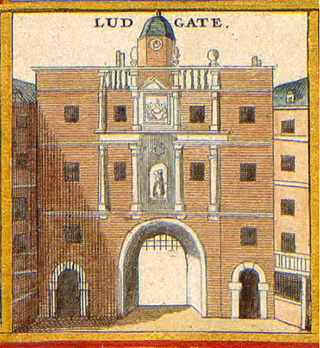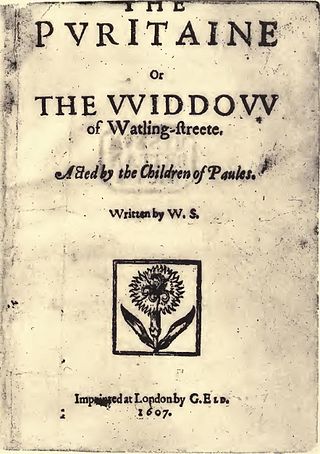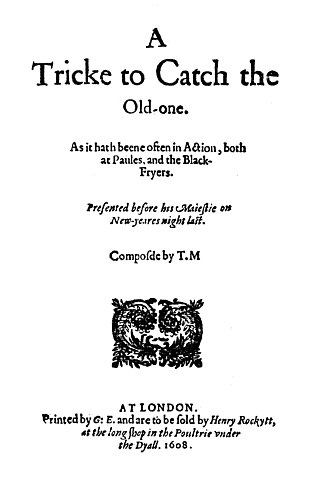Related Research Articles

Elizabeth "Jane" Shore was one of the many mistresses of King Edward IV of England. She became the best-known to history through being later accused of conspiracy by the future King Richard III, and compelled to do public penance. She was also a sometime mistress of other noblemen, including Edward's stepson, Thomas Grey, 1st Marquess of Dorset, and William Hastings, 1st Baron Hastings but ended her life in bourgeois respectability.

Little Dorrit is a novel by Charles Dickens, originally published in serial form between 1855 and 1857. The story features Amy Dorrit, youngest child of her family, born and raised in the Marshalsea prison for debtors in London. Arthur Clennam encounters her after returning home from a 20-year absence, ready to begin his life anew.
William Rowley was an English Jacobean dramatist, best known for works written in collaboration with more successful writers. His date of birth is estimated to have been c. 1585; he was buried on 11 February 1626 in the graveyard of St James's, Clerkenwell in north London.

Ludgate was the westernmost gate in London Wall. Of Roman origin, it was rebuilt several times and finally demolished in 1760. The name survives in Ludgate Hill, an eastward continuation of Fleet Street, Ludgate Circus and Ludgate Square.
The Birth of Merlin, or, The Child Hath Found his Father is a Jacobean play, probably written in whole or part by William Rowley. It was first performed in 1622 at the Curtain Theatre in Shoreditch. It contains a comic depiction of the birth of the fully grown Merlin to a country girl, and also features figures from Arthurian legend, including Uther Pendragon, Vortigern, and Aurelius Ambrosius.

Taken at the Flood is a work of detective fiction by British writer Agatha Christie, first published in the US by Dodd, Mead and Company in March 1948 under the title of There is a Tide. .. and in the UK by the Collins Crime Club in the November of the same year under Christie's original title. The US edition retailed at $2.50 and the UK edition at eight shillings and sixpence (8/6). It features her famous Belgian detective, Hercule Poirot, and is set in 1946.

The Puritan, or the Widow of Watling Street, also known as The Puritan Widow, is an anonymous Jacobean stage comedy, first published in 1607. It is often attributed to Thomas Middleton, but also belongs to the Shakespeare Apocrypha due to its title page attribution to "W.S.".

The Witch of Edmonton is an English Jacobean play, written by William Rowley, Thomas Dekker and John Ford in 1621.

The Roaring Girl is a Jacobean stage play, a comedy written by Thomas Middleton and Thomas Dekker c. 1607–1610.
No Wit, No Help Like a Woman's is a Jacobean tragicomic play by Thomas Middleton.

A Trick to Catch the Old One is a Jacobean comedy written by Thomas Middleton, first published in 1608. The play is a satire in the subgenre of city comedy.
More Dissemblers Besides Women is a Jacobean stage play, a tragicomedy written by Thomas Middleton, and first published in 1657.

The Maid in the Mill is a late Jacobean era stage play, a comedy written by John Fletcher and William Rowley. It was initially published in the first Beaumont and Fletcher folio of 1647.
A Mad Couple Well-Match'd is a Caroline era stage play, a comedy written by Richard Brome. It was first published in the 1653 Brome collection Five New Plays, issued by the booksellers Humphrey Moseley, Richard Marriot, and Thomas Dring.
A Match at Midnight is a Jacobean era stage play first printed in 1633, a comedy that represents a stubborn and persistent authorship problem in English Renaissance drama.
A Shoemaker a Gentleman is a Jacobean era stage play, a comedy written by William Rowley. It may be Rowley's only extant solo comedy.
Fortune by Land and Sea is a Jacobean era stage play, a romantic melodrama written by Thomas Heywood and William Rowley. The play has attracted the attention of modern critics for its juxtaposition of the themes of primogeniture and piracy.
Sir Stephen Forster was a fishmonger and later Lord Mayor of London.
Lady Agnes Fo(r)ster was a wealthy English woman. She rebuilt Ludgate Prison for debtors. Her accounts are extant.
The Innocent Mistress is a comedy written by Mary Pix, first performed in 1697.
References
- Chambers, E. K. The Elizabethan Stage. 4 Volumes, Oxford, Clarendon Press, 1923.
- Clark, Ira. "The Widow Hunt on the Tudor and Stuart Stage." Studies in English Literature 1500–1900, Vol. 41 No. 2 (Spring 2001), pp. 399–416.
- Darby, Trudi Laura, ed. A Critical Old-Spelling Edition of William Rowley's A New Wonder, a Woman Never Vexed. New York, Garland, 1988.
- Howard, Jean E. Theater of a City: The Places of London Comedy 1598–1642. Philadelphia, University of Pennsylvania Press, 2006.